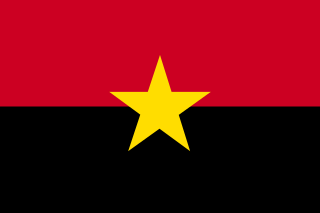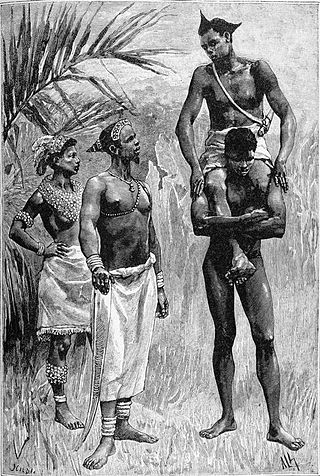
The current political regime in Angola is presidentialism, in which the President of the Republic is also head of state and government; it is advised by a Council of Ministers, which together with the President form the national executive power. Legislative power rests with the 220 parliamentarians elected to the National Assembly. The President of the Republic, together with the parliament, appoints the majority of the members of the two highest bodies of the judiciary, that is, the Constitutional Court and the Supreme Court. The judiciary is still made up of the Court of Auditors and the Supreme Military Court.
These are lists of incumbents, including heads of states or of subnational entities.

Angola was first settled by San hunter-gatherer societies before the northern domains came under the rule of Bantu states such as Kongo and Ndongo. In the 15th century, Portuguese colonists began trading, and a settlement was established at Luanda during the 16th century. Portugal annexed territories in the region which were ruled as a colony from 1655, and Angola was incorporated as an overseas province of Portugal in 1951. After the Angolan War of Independence, which ended in 1974 with an army mutiny and leftist coup in Lisbon, Angola achieved independence in 1975 through the Alvor Agreement. After independence, Angola entered a long period of civil war that lasted until 2002.

A presidential system, or single executive system, is a form of government in which a head of government, typically with the title of president, leads an executive branch that is separate from the legislative branch in systems that use separation of powers. This head of government is in most cases also the head of state. In a presidential system, the head of government is directly or indirectly elected by a group of citizens and is not responsible to the legislature, and the legislature cannot dismiss the president except in extraordinary cases. A presidential system contrasts with a parliamentary system, where the head of government comes to power by gaining the confidence of an elected legislature.

The People's Movement for the Liberation of Angola, for some years called the People's Movement for the Liberation of Angola – Labour Party, is an Angolan social democratic political party. The MPLA fought against the Portuguese Army in the Angolan War of Independence from 1961 to 1974, and defeated the National Union for the Total Independence of Angola (UNITA) and the National Liberation Front of Angola (FNLA) in the Angolan Civil War. The party has ruled Angola since the country's independence from Portugal in 1975, being the de facto government throughout the civil war and continuing to rule afterwards.

The president of Angola is both head of state and head of government in Angola. According to the constitution adopted in 2010, the post of prime minister is abolished; executive authority belongs to the president who has also a degree of legislative power, as he can govern by decree.

Álvaro Holden Roberto was an Angolan politician who founded and led the National Liberation Front of Angola (FNLA) from 1962 to 1999. His memoirs are unfinished.

The prime minister of Ethiopia is the head of government and chief executive of Ethiopia. Ethiopia is a parliamentary republic with a prime minister as head of the government and the commander-in-chief of the Ethiopian Armed Forces. The prime minister is the most powerful political figure in Ethiopian politics. The official residence of the prime minister is the Menelik Palace in Addis Ababa. The prime minister is elected from the members of the House of Peoples' Representatives and presents a government platform. The prime minister must receive a vote of confidence in the House of Peoples' Representatives to exercise executive power as chief executive. Abiy Ahmed is the third prime minister of the Federal Democratic Republic of Ethiopia, serving since April 2018.

The Prime Minister of the Democratic Republic of the Congo is the head of government of the Democratic Republic of the Congo. The Constitution of the Third Republic grants the Prime Minister a significant amount of power.

The Lunda are a Bantu ethnic group that originated in what is now the Democratic Republic of the Congo along the Kalanyi River and formed the Kingdom of Lunda in the 17th century under their ruler, Mwata Yamvo or Mwaant Yav, with their capital at Musumba. From there they spread widely through Katanga and into Eastern Angola, north-western Zambia and the Luapula valley of Zambia.

The People's Republic of Angola was the self-declared socialist state which governed Angola from its independence in 1975 until 25 August 1992, during the Angolan Civil War.

The following outline is provided as an overview of and topical guide to Angola:

The vice president of Angola is the second highest political position in Angola; it is appointed by and is the deputy to the president. The position was established by the constitution of 2010.

The Democratic People's Republic of Angola, also referred to as Free Angola or the Free Land of Angola, was a rival government to that of the People's Republic of Angola during the nation's civil war.
Henrique III Mpanzu a Nsindi a Nimi a Lukeni was ruler of the Kingdom of Kongo from the Kivuzi branch of the Kinlaza house, who reigned from 1840 until 1857.